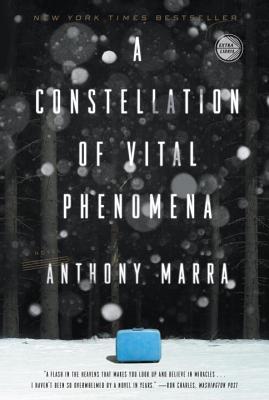The best book I read this year, hands down was on all the best lists last year, A Constellation of Vital Phenomena [herein Constellation] by Anthony Marra.
This is an awfully hard book to book talk though because what it is actual about and why you would love it cannot be given in a soundbite. This is because how it is written is part of the joy of reading it, but more importantly, to tell anyone what it is actually about before they begin this novel would ruin the joy of discovering what lies at its center.
Intrigued?
Well, now I can share the basic surface plot information-- Constellation follows a handful of interconnected characters during the second Chechen War. Not very light, I know, but trust me it is equal turns heartbreaking and beautiful.
Notice I led this bare bones description of the most basic plot elements with “interconnected characters.” This is key because as the story begins, it is not clear how the characters and their personal stories will match up, but over time we see how they all relate to and even inspire one and other. That is the beauty of the novel.
The characters are key here and they all center around keeping a young girl named Hava safe. We have her father, their neighbors, and 2 women who are sisters but have been separated.
Within the focus of the characters lies a lyrical, methodical yet compelling, and complex story of a modern, regional conflict. We see the toll it plays on the lives of regular people. We watch the characters make difficult choices. And we see a true picture of the reality behind the small sound bites we usually get of world news. These are not uneducated, backwoods, rural people. These are people like us, who are just trying to survive in a war zone. That is one of the most thought-provoking terrifying things about this work; how far away it seems, yet how close it really is.
This is a sobering war story. The reader is not spared any of the horrors, especially the horrific ways people act when their backs are against the wall. But there are also many beautiful scenes-- some heartbreakingly beautiful and other just simply beautiful.
The other remarkable thing to point out about Constellation the the style Marra chose to tell it. Each chapter begins with a timeline of the 10 years over which the story is set, and the year we are dealing with in the chapter at hand is bolded. For example, the first chapter takes place in the final year of the story [2004]. The story skips around, but we get these cardinal points to orient ourselves before we dive into a new chapter.
Along with the fluctuating time line, the pov also shifts. But rather than confound the reader, these two choices make the novel better. It allows the story to unfold in a more compelling, and less depressing manner. We also get to see what happens to every character, which is highly satisfying.
The mixed up timeline and pov shifts also allow the story to end with a beautiful scene. Marra is not a slave to the straight progression, and can step back in time to wrap everything up with a scene from the story’s past, but one that is better at closing the novel both tone-wise and story-wise.
I was amazed by Marra’s restraint as a storyteller. He takes his time and slowly set all the the pieces in place. Reading Constellation is like putting a puzzle together. It requires work from the reader, but oddly, it didn't feel like work. The story flowed easily and was a joy to follow. This also gave the novel a magical realism feel despite the fact that there is not a shred of fantasy or magic here. It is all realism.
I would have never picked up a novel about the Chechen war, but I am so glad others did and talked it up to me. It was a wonderful reading experience.
Three Words That Describe This Book: character centered, stylistically complex, heartbreakingly beautiful.
Readalikes: As I mentioned in my book discussion report, A Tale for the Time Being by Ruth Ozeki is a great readalike. Click through for details on why.
A book I read years ago, Away by Amy Bloom, came to mind as I was reading Constellation. It is a bit lighter but has a similar idea. Here, we have a historical story of a mom who travels across the country to find her daughter. In Bloom’s novel you also get to find out what happens to characters after they leave the main storyline.
Await Your Reply by Dan Chaon also has a purposely mixed up timeline but one that adds to the readers enjoyment. Both novels are tense and emotionally difficult, but so worth the journey. With both novels, although they are sobering, you are not sad when you finish. You are more blown away by the technical mastery, and appreciate having been part of it all.
Many readers might want to read other similar works set in different modern war zones. Two of the better ones I would suggest are The Tiger’s Wife by Tea Obreht [Balkan War, actual magical realism here] or The Yellow Birds by Kevin Powers [Iraq].
Finally, like Constellation was last year, All the Light We Cannot See by Anthony Doerr is one of this year’s best. Both are stylistically complex, atmospheric, lyrical, and moving war stories.
#HorrorForLibraries Giveaway: New Edition of Night of the Mannequins and a
Bonus Novella (for a great cause)
-
Today on the giveaway I have two finished novellas for 1winner. The first, a
re-release of a Stephen Graham Jones novella (out next week); the other, a
t...
2 hours ago










No comments:
Post a Comment